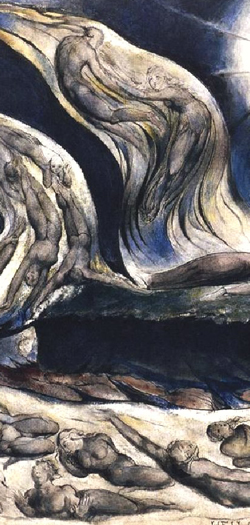I can’t speak intelligently about the precepts of Buddhism because my knowledge is pretty shallow. After 17 years of Catholic school I feel like I have a slightly better grounding in Christianity. When I was a teenager I read The Great Divorce by C.S. Lewis and I still remember parts of it. One section in particular sticks in my mind.
 In the Great Divorce the narrator finds himself in either hell or purgatory. The place isn’t particularly unpleasant but an undercurrent of misery is present because of the distance from God. The characters take a bus tour to heaven, and we are faced with a woman who can’t stay in heaven because of her deep attachment.
In the Great Divorce the narrator finds himself in either hell or purgatory. The place isn’t particularly unpleasant but an undercurrent of misery is present because of the distance from God. The characters take a bus tour to heaven, and we are faced with a woman who can’t stay in heaven because of her deep attachment.
The woman is missing her son. Lewis implies that she is kept from heaven, not by some rule placed down by God, but by the woman’s self inflicted blindness. She loves her son more than anything, including God, therefor she can’t make it to heaven.
Something similar is seen in Dante’s Inferno when we meet a pair of lovers pressed together in a constant whirlwind. I think they were technically being punished for adultery, but we are told that they are in hell because they are so wrapped up in each other that there is no room for God. Personally I thought that was kinda romantic, but I’m pretty sure that was not the correct reaction.
It always seemed unfair to me that it could be a sin to love someone too much. I get how the love of money or riches can be immoral, that kind of detachment makes sense to me. Total detachment though includes people and self as well as things. Christianity is tricky, it tries to balance a vengeful, jealous Old Testament God with the loving father Jesus presents. A god that punishes his followers for loving their children more than Him strikes me as more Old Testament, and just as I can’t believe in a god that condemns good people who happen to be the wrong religion, I won’t believe in a god that punishes love. **
 Material detachment is further complicated by the ways Christianity has historically been used by oppressors. Non-attachment, along with obedience, are qualities typically stressed by upper classes trying to keep slaves or the poor under control. The meek will inherit the earth, just wait it out. Heaven, like America, is paved with gold (unlike hell which is paved with good intentions). Modern day Christianity is less underhanded and the themes seem to at least be supported by those who chose the simple pastoral life. Still, I am automatically suspicious of the Christian tenets of non materialism.
Material detachment is further complicated by the ways Christianity has historically been used by oppressors. Non-attachment, along with obedience, are qualities typically stressed by upper classes trying to keep slaves or the poor under control. The meek will inherit the earth, just wait it out. Heaven, like America, is paved with gold (unlike hell which is paved with good intentions). Modern day Christianity is less underhanded and the themes seem to at least be supported by those who chose the simple pastoral life. Still, I am automatically suspicious of the Christian tenets of non materialism.
The avoidance of desire in Buddhism seems less dubious, possibly because the history of Buddhism is more benign. At least as far as I know. I tell people I’m a militant Buddhist, just to see if they get the joke.
Even so, the no desire concept in Buddhism likewise extends to people as well as things. For the last few years I’ve been happy, even joyful, because of people. Ironically this makes it easier for me to abandon desire: I want for very little. I am however, inextricably attached.
People talk about the paradox of no desire: how can you stop desire without desiring to stop desire? I’ve always seen this less as a true paradox than a paradox of language. I think I understand the answer, even if English cannot describe it. What I can’t answer though is how I can detach from that which allows me to detach. I hate that stupid saying about how if you truly love something, you have to set it free. Neither I nor my husband is a bird.
I guess for me the dilemma of Buddhism is the concept of afterlife. Attachment keeps us tied to this world, in long cycles of reincarnation. When we gain nirvana we rise to… what? To a drop of water in an endless sea. I don’t see the appeal. Perhaps my greatest problem with Buddhism, and the thing keeping me from enlightenment is that I just don’t desire it.
*Photos from Wikimedia and Flickr user Fabi Dorighello
** Excerpt removed. See comments for explanation.
8 Replies to “No Desire for No Desire”
Comments are closed.